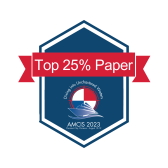Loading...
Paper Type
ERF
Description
This study develops and presents a framework that assesses the impact of information and communication technology (ICT) permeability on work and family outcomes among dual-career couples who live together and work from home (WFH). As these couples depend heavily on ICTs to coordinate work, family responsibilities, and communication with each other, they can face cognitive and emotional limitations. Our model suggests that the level of ICT permeability in WFH situations is positively related to ICT fatigue, which can lead to negative family outcomes. Moreover, we investigate the effect of ICT permeability on positive work outcomes through goal progress. Using a 10-day diary approach with dual-career couples in live-in partnerships, we provide robust empirical evidence that supports our model. Our findings contribute to the existing literature on WFH, which has been facilitated using advanced ICTs.
Paper Number
1695
Recommended Citation
Sundrup, Rui; Ahuja, Manju; and Magni, Massimo, "The Role of ICT Permeability on Work and Family Outcomes When Working from Home" (2023). AMCIS 2023 Proceedings. 5.
https://aisel.aisnet.org/amcis2023/sig_cnow/sig_cnow/5
The Role of ICT Permeability on Work and Family Outcomes When Working from Home
This study develops and presents a framework that assesses the impact of information and communication technology (ICT) permeability on work and family outcomes among dual-career couples who live together and work from home (WFH). As these couples depend heavily on ICTs to coordinate work, family responsibilities, and communication with each other, they can face cognitive and emotional limitations. Our model suggests that the level of ICT permeability in WFH situations is positively related to ICT fatigue, which can lead to negative family outcomes. Moreover, we investigate the effect of ICT permeability on positive work outcomes through goal progress. Using a 10-day diary approach with dual-career couples in live-in partnerships, we provide robust empirical evidence that supports our model. Our findings contribute to the existing literature on WFH, which has been facilitated using advanced ICTs.
When commenting on articles, please be friendly, welcoming, respectful and abide by the AIS eLibrary Discussion Thread Code of Conduct posted here.




Comments
SIG CNoW